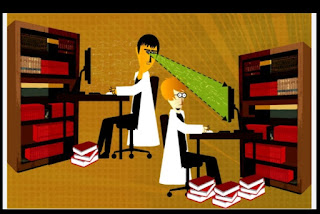Hello Everyone,
I am Hinaba Sarvaiya, a student of the English Department at MKBUniversity. This blog is assigned by our Medha Ma'am. This blog is based on 'Plagiarism and Academic Integrity'.
What is Plagiarism:-
MLA Handbook of Literary Research defines plagiarism as “intellectual theft”, the word plagiarism derived from the Latin word plagiarius which means ‘kidnapper.’ In computer language it can be termed as hackers who hacks the people’s ideas, thoughts and work.(MLA)
Accordingly to Oxford Dictionary:
Plagiarism is presenting someone else’s work or ideas as your own, with or without their consent, by incorporating it into your work without full acknowledgement.
All published and unpublished material, whether in manuscript, printed or electronic form, is covered under this definition. Plagiarism may be intentional or reckless, or unintentional. Under the regulations for examinations, intentional or reckless plagiarism is a disciplinary offence.
Consequences of Plagiarism:-
With plagiarism detection software so readily available and in use like Urkund, plagiarism can be easily caught, results of that can be personal, professional, ethical, and legal. Once anyone is accused of plagiarism, a person will most likely always be regarded with suspicion and provoke skepticism. The charge of plagiarism is a serious one for all writers, journalists, research scholars, faculties and students. Plagiarists are often considered as incapable of developing and expressing their own original thoughts, ideas or opinions and willing to deceive others. Professional writers like journalists when accused of Plagiarism they can lose their jobs and suffer public embarrassment and loss of prestige.
Destroyed Student or Scholar Reputation:-
Students who plagiarize or engage in academic dishonesty face serious consequences like failure in the assignment, grade reduction or course failure, suspension, and possibly dismissal.
Destroyed Academic and Professional Reputation :-
Their work without caring about citing other's work and presenting it as their original writing may lose the trust of the readers and that trust is never easy to win.
Legal and Monetary Repercussions:-
Legal consequences of plagiarism can be quite serious. Copyright laws are there, one cannot use another person’s material without citation and reference. An author has the right to complain against a plagiarist.
How to know Plagiarism:-
Today, Technology has advanced in many ways as it also provides useful software so that we can easily check the percentage of plagiarism that students or research scholars have done.
These are some plagiarism detection software for students or research scholars
Scribbr Plagiarism Checker
Urkund
Grammarly
PlagScan
Copyscape
iThenticate
Unicheck
In each plagiarism checker we can find the plagiarism percentage that shows how much we have copied.
How to avoid Plagiarism
Plagiarism is a very serious issue of academia. It severely harms academic integrity. Thus students and researchers are made aware about proper documentation. It can be only avoided by proper citation. Most of the universities use plagiarism detection software to uncover potential plagiarism and to deter students from plagiarizing. Academic integrity can be maintained by providing students with thorough orientations, required writing courses, and clearly articulated honor codes. By generating a uniform understanding among students and researchers that plagiarism is wrong.
Thank You for visiting my blog!!





No comments:
Post a Comment